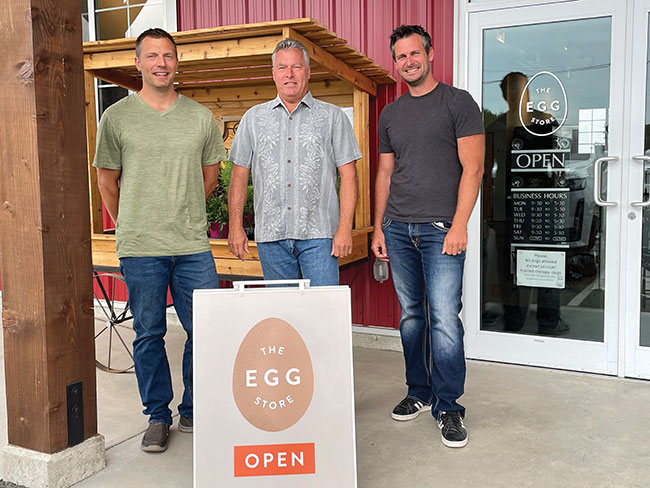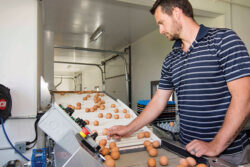
Who’s Who – B.C. – Mark and Bryan Siemens
By Ronda Payne
Features ProducersTogether, two brothers grew an 80,000-bird egg farm. Now, the next generation of brothers have continued growing the operation.
 Brothers Bryan Siemens (left) and Mark (right) run an egg operation with help from their father Walter (middle).
PHOTO CREDIT: Siemens Farms Ltd.
Brothers Bryan Siemens (left) and Mark (right) run an egg operation with help from their father Walter (middle).
PHOTO CREDIT: Siemens Farms Ltd. Together, two brothers grew an 80,000-bird egg farm. Now, the next generation of brothers continue growing it together, but also apart. Mark and Bryan Siemens are following their family’s path dedicated to laying hen operations in Abbotsford, B.C.
Like their father and uncle, they collaborate and share with other farmers within their family and neighbourhood, but also expand knowledge far beyond their regional borders.
“He came here from Paraguay, was working on the railway and some acreage, was farming raspberries,” says Mark Siemens of his grandfather who established the family’s first farm in the 1960s. “When the supply management system came in, he got into egg production and was one of the original farms back then.”
Siemens’ father Walter and uncle got into the business at a young age, starting with a few thousand birds and embracing the changes and challenges the industry threw at them as they took things on from their father. Walter and his brother grew the operation to about 80,000 birds. That’s when Mark and his brother Bryan stepped back into farming and started exploring what it could look like with them at the helm.
“In 2005 to 2014 my brother and I were both off the farm doing other things, getting other experiences in life,” Mark says. “My dad and his brother were farming together, but as part of their succession planning, they bought a couple of properties over the years and they were able to separate their farm into two.”
While these two farms operated as one entity for Walter and his brother, Mark and Bryan finalized that separation so they could continue to work together, but also each have their own farm.
“We’re both able to use our leadership skills without butting heads,” he says. “Now, we’re able to really work together and support each other, but have independence in those day-to-day decisions and we have a really great relationship.”
Walter’s new role
Taking a step back is hard for any farmer, but Mark gives his dad credit for being able to let his sons run with the businesses and make their own mistakes.
“He has taken a real mentorship role. He gave us oversight as we went through the learning curve of building new farms,” he says. “Each year he really gave us more and more freedom. He’s really involved in the industry with Egg Farms of Canada.”
That industry awareness has been essential for the brothers as they’ve grown the businesses. Not long after they took the operation over, they saw the future of the industry going to either enriched housing or aviary. The knew they needed a new barn, but which way would they go?
“We looked at the aviary system and the labour demands and the fact that it would make economic sense to build two separate farms instead of one large farm and that’s what really drove that,” he explains. “My dad has been involved in the industry on a global scale and that helped my brother and me make those decisions.”
Shift into aviary production
The new free-range aviary operation built in 2015 was a big shift for the farm. And a daunting one at that, what with moving away from cages and conventional flat barns. “After a steep learning curve, we’ve had a lot of success in that [aviary system],” Siemens says.
His barn was first, then they built another aviary system facility for Bryan’s farm. Each brother now manages mixes of about 50,000 Lohmann Brown and Novogen Brown hens. Mark’s operation is free-range while Bryan’s is both free-range and organic.
Recognizing the enriched housing system wasn’t the right fit for the farms, the multi-staged aviary has played out well for both the birds and the brothers.
“It’s kind of like a jungle gym playground for chickens,” he says. “We were confident in our ability to figure it out and take on that new challenge.”
Now, several years into the system of long platforms that accommodate feed, water, laying eggs and dust bathing, the brothers have been able to step away from the very long days of learning and trouble-shooting into more of a systematic approach with staff they’ve trained.
“The farm is an amazing place,” Mark says. “Me and my brother are really experienced in this type of production now. We had to learn it for ourselves to be able to train employees,” he explains. “There were a lot of long hours, a lot of mistakes made, not knowing the tricks to make a chicken lay an egg in a nest. A lot of learning through trial and error.”
The amount of labour and workhours with each bird goes up with the lack of enclosure. Getting familiar with the system and training staff on it helped Mark and Bryan get their time back, but that doesn’t mean the aviaries have made them bored or complacent.
“One of the things that’s fun and frustrating about it is that in the cage-free farming, every flock has unique challenges. It keeps you engaged,” he says. “Some birds won’t respond to the old tricks. There’s always room for improvement.”
The Egg Store
They identified one place for improvement on a community-level during the pandemic.

The producers switched to an aviary housing system several years ago, which was a daunting transition.
PHOTO CREDIT: Siemens Farms Ltd.
“After the farms were built, we had a small farmgate style store that had been on the farm for almost two decades,” he explains. “When the pandemic hit and the challenges that brought about, we transitioned from that shack to a drive-thru.”
While this helped people get their eggs, it became clear that there was a significant need for community-based shopping experiences with a local farm feel.
“My brother started construction,” Siemens notes. “Building a designated farm store. We began that during the pandemic. In 2022, he opened the store.”
Now, seniors and other s in the community have a place that provides a farm feel when they buy their eggs, beef, pork, vegetables and other locally produced food.
Knowledge transfer
Shifting to an aviary system to keep up with trends seen in Europe is one way the brothers are staying ahead of evolution in the industry. Another is listening to others in the industry, regardless of where they are located.
“As genetics change, we’ll often have a lot of farmers going through the same things,” he says. “It really brings the community together.”
Community is important to the Siemens family and being connected with other laying hen farmers is part of the business. Walter showed his boys the importance of being part of information exchanges and he continues to do so as the vice chair of the B.C. Egg Marketing Board and a member of the executive with Egg Farmers of Canada.
“Around the same time I came back to the family farm, I got on the B.C. Egg Producers,” Mark says. “After a bit of experience there, I took on the role of president. I’ve been that now for eight or nine years.”
Bryan sits on the B.C. Egg Marketing Board audit and finance committee.
Without that shared knowledge, from a global perspective, the brothers wouldn’t have had the information needed to make an informed decision on how to move the farm forward.
Staying involved in industry associations is one of the many ways this family can gain the information needed to embrace the changing trends.
Print this page